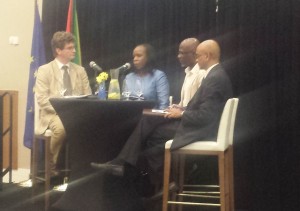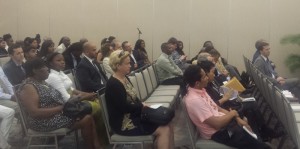Hydropower plugged as key to green economy at Climate change forum
By Jomo Paul

The panelists: Dr Paulette Bynoe, Gary Best and Dr David Singh along with moderator, British High Commissioner Greg Quinn.
[www.inewsguyana.com] – Emphasis was placed the development of Hydropower and the abolishment of fossil fuels on Thursday, September 17 when several specialists sat to discuss the issue at the Marriott Hotel.
The for a, organized by the European Union, is seen as a precursor to the Paris 2015 Climate change talks where world leaders are expected to radically push for more to be done against the issue.
On the local side, the call for Guyana and other countries in the world to move away from fossil fuels and pursue renewable sources of energy in a green economy was resounding clear.
Several participants, including those on the panel, pushed the notion that Hydropower could act as pacifier for climate change and its effects.
Presidential Advisor on Climate Change, Gary Best, who was one of the panelists, said that it is important the discussions focus on the solutions to the issue rather than pointing figures to who may be responsible..
“Until technology reaches the point where burning fossils will result in little emissions into the atmosphere, our best bet is to move ahead with alternative energy,” said Best.
He noted too that one of the more formidable energy solutions for Guyana would be hydropower. Dr David Singh, the Executive Director of Conservation International, also one of the panelists, supported the call for Hydropower as a solution to Guyana’s climate change issues.
“Nature based solutions are the best solutions…I do feel that hydropower must be seriously considered even from now. I don’t think we can wait,” said Dr Singh.
Dr Paulette Bynoe, head of the University of Guyana School of Earth and Natural Sciences, posited that hydropower should not be looked at in isolation.
She said that the solution also lies in other forms of renewable energy such as solar and wind power.
“If you are going to talk about hydro, you also have to factor in the issue of droughts. We get a lot of droughts…the regional climate models tell us that we are going to have a drier Caribbean,” said Bynoe.
The only large scale hydropower projected started in Guyana was scrapped by the new APNU+AFC government with Finance Minister Winston Jordan declaring that it would be criminal to proceed with the Amaila Falls Hydropower Project.
This he said will total US$2.6B over the 20 year period, according to the power purchase agreement and does not include Guyana’s contribution of at least US$160M comprising $45M for road, $80M through equity and $US45M that will have to be taken from the Inter -American Development Bank (IDB).


